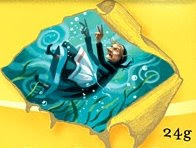After my last post, I got to thinking and decided to post a translation of Senhor Andrade's poem. I decided to do my own translation because I hadn't translated anything for awhile and I figure I could probably use the practice. I'm not going to retype the Portuguese version, you'll just have to look at my last post if you'd like to see it. So here goes:
In the middle of the path there was a stone
there was a stone in the middle of the path
there was a stone
in the middle of the path there was a stone.
I will never forget this occurrence
in the life of my fatigued retinas.
It will not be forgotten that in the middle of the path
there was a stone
there was a stone in the middle of the path
in the middle of the path there was a stone.
- Carlos Drummond de Andrade (translation by Bill)
Some people may disagree with my translation, so I would like to explain some of my decisions.
The first thing I'd like to explain is my translation of "tinha". Roughly "tinha" is translated as "I/you had" or "I/you used to have". I chose to translate it as "there was" in this case because I think it's more in keeping with the feeling of the poem in Portuguese. Perhaps I'm misinterpreting the meaning of the Poem, and maybe that is why I seemed to have such a different view than my teacher who is a native Brazilian, but it's what I understand when I read the poem, so in essence I'm translating my understanding.
The second thing I'd like to look at is some of my English word choices. For caminho, I chose path. I suppose I could have used way, road, street, direction, etc. Something about the word path, however, seemed appropriate. I tend to use the word path when thinking in a metaphysical way. I feel that "path" implies multiple layers of thought that some of it's synonyms do not and this lends itself to greater imagery and depth as you contemplate the poem. I also chose the word "stone" to take the place of "pedra". I originally thought pebble because of the "p", but I think stone is more correct. The word, "pedra", is kind of generic; given neither size nor shape. I feel pebble would be to specific to fit this poem accurately. "Stone", however, allows the reader to give his own personal dimensions to the object.
The words that I had the most trouble with were in the second stanza. In the first line I decided to use "occurrence", but I'm still not entirely sold on it. I'd also thought to use: happening, incident, and event. My first instinct was to use event, in fact that was the first word that came to mind, but it seemed to short to fit. I eventually whittled it down to occurrence and happening. I still feel like happening could work, but I decided to go with occurrence for now. The second line gave me some trouble as well. The phrase "fatigued retinas" doesn't seem right to me, but I think this rather raw translation is in keeping with the spirit and intent of the poem. I considered other words, but none of them seemed quite right. I thought of changing retinas, but most of the words that I thought of have direct translations into Portuguese, so I didn't want to use them because senhor Andrade didn't use them. For instance, I thought of using, "tired eyes", but that could have been easily expressed in Portuguese as "olhos cansados". I decided that Andrade was looking for a deeper meaning, and I didn't want to lose that. I seem to get a sense that the use of "retinas" implies a depth. It's the back of his eyes that are tired, and not just tired, they're fatigued. Perhaps to say they're tired of looking at the path before him? It's this lack of clarity that has led me to keep the "raw" translation, because I would rather have a crude translation that keeps the interpretation open than to force a reader to read my interpretation.
The last part that I had difficulty with was the first line of the last stanza. I originally translated it to match up with the first line of the second stanza, but the two lines are written differently in Portuguese. It's actually a very subtle distinction, and one that is perhaps lost in English. In the third stanza Andrade adds a reflexive "me" to esquecerei. The reflexive "me" would, I think, roughly translate as "myself", but one of my grammar books pointed out that it's often used to represent a passive voice. I decided to try and take this tact and attempted to make the first line of the third stanza passive. I'm not really sure if I succeeded in my attempt. Perhaps an English scholar could critique this for me. If nothing else, I did find a way to differentiate the two while maintaining the meaning.
Hopefully my translation hasn't butchered the simple complexity of this poem. Also, I hope you understand why I made the choices that I made and that those choices are acceptable. If you've never translated something before, I hope this has opened your eyes a bit to the world of communication. I know that even though I'm not a professional translator, the exercise of translating has taught me a great deal about communication and people in general.
Saturday, June 28, 2008
Subscribe to:
Post Comments (Atom)

3 comments:
It's been awhile !!!! We need a new post!!!!
where have you gone? internet guru...we want you back!
So we know you have someone special to listen to all of your crazy thoughts, but share of few of them.....
Post a Comment